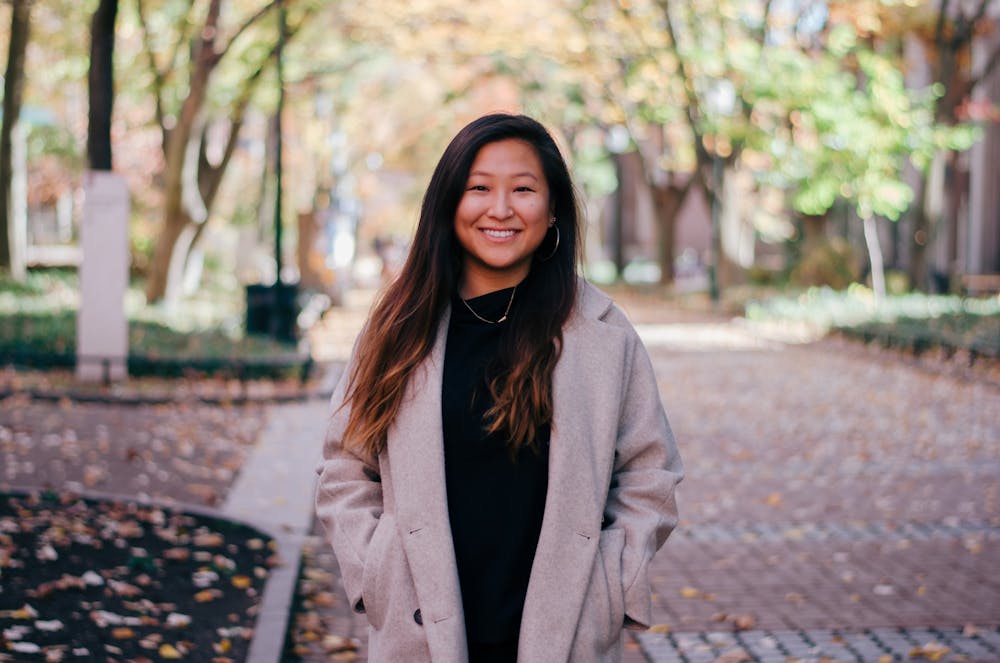“I was in my apartment, getting ready to head to the rally of Count Every Vote,” Sarah Min (GSE ‘16/SP2 ‘20) details the moment she heard the results of the U.S. presidential election. “All of a sudden, my phone is blowing up. All my personal friend chats, my community organizing chats—and then I started getting back–to–back FaceTime calls, just being stunned and celebratory and literally crying on the phone with friends.”
Even so, Sarah is careful not to over–glorify Joe Biden’s victory. “We did not win because Biden did it. We did it. The people did it. Black leadership did it.” The activist’s commitment to her work shines through as she declares: “I will celebrate today, rest tomorrow, and we are getting back to work on Monday,” where she hopes to sustain the political momentum of the election by holding the President–Elect accountable.
Ever since she graduated from Penn’s School of Social Policy & Practice, the Philadelphia resident has devoted her life to community organizing around the election, showing up on the streets every week ready to use her voice to advocate for social justice causes. Sarah's path to collective action speaks to her courage and strong sense of righteousness. “I grew up in an immigrant family that was very apolitical, in a upper middle class suburban neighborhood where many people were complacent," she says. "I’ve had to re–learn and dismantle everything that was taught to me growing up.”
After earning her undergraduate degree from Penn State, the Pennsylvania native joined Teach for America, where she was trained and placed at a high school in West Philadelphia. While there, she balanced her work as a special education teacher with preparation for a Master's in Urban Education, which she received from Penn’s Graduate School of Education in 2016. During her third year of teaching, she lost a close friend from the Korean community in Philadelphia. She had also lost multiple students to gun violence. Experiencing the unjust realities of institutional racism and lack of education and mental health support in communities of color, Sarah felt compelled to devote her life to fighting injustice.
“It didn’t make sense to me that my kids didn’t have a gym, or my kids had such limited food options because most of them qualified for free or reduced lunch. They didn’t have health class," Sarah says. "For so many things that I think our suburban public schools take for granted, my kids had zero access. Our school didn’t even have a field to practice sports.”

Pursuing her desire to achieve change in her community, Sarah returned to school in 2017, graduating from Penn’s School of Social Policy and Practice with a Masters in Social Work this past May. Ever since, she has devoted her time to advocacy work.
For instance, the Korean–American committed a great deal of time and effort into developing Penn Community for Justice, a platform for members of the Penn community who want the university to take social responsibility through actions like paying PILOTs and defunding the Penn police. “The fact that we are such a small school, but with the largest private police force in the state and one of the largest campus forces in the country makes no sense. I am optimistic that this community and organizers will find alternative ways of community safety that doesn’t require violent police force,” Sarah says. “Penn needs to understand that being the largest employer in the city with a fourteen billion dollar endowment has a community responsibility. I’m optimistic that organizers—students, faculty, alumni—will all get together and say, ‘We know our students and communities deserve better.’”
After spending part of her summer working to hold Penn accountable, Sarah joined People’s Action, a national political organization with the motto ‘Defeat Trump and Heal America.’ “I was one of three national staff members leading our national texting program, and we threw down in pretty much eight battleground states," Sarah says. The community organizer and her colleagues had to quickly adapt to America’s changing cultural atmosphere and health crisis: “We knew we were going to have to do a lot to show up, and [that it was] going to have to be creative and look different, especially with social distancing.”
One of the highlights of the Korean-American activist’s experience protesting happened the Thursday after the election, when she spoke at a rally in Harrisburg for Count Every Vote as part of the Woori Center, a local advocacy group that organizes Korean and Asian Americans towards social, racial, and economic justice. “It was the first time I’ve seen Latinx, Black, and Asian community organizers get together and do chants in English, Spanish, and Korean,” she enthuses. “I never thought I’d be in Harrisburg leading a chant, with people saying 할수있다—“Yes we can” in Korean! I was like, what in the world, am I dreaming right now?”
The moment encapsulated her belief in the power of people to unite and declare: “Our votes matter. We will not be silenced by white supremacy tactics anymore.”
Sarah is optimistic in her vision for America’s future. Her story is an emblem for people seeking revolutionary political change. “I want people to not be cynical ... We’re stuck in the world that is given to us," she says. "Instead, if you don’t like something, why can’t you just get organized and see how many other people also want change for the future?”







